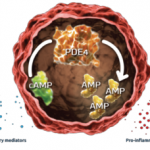An expert in psoriatic arthritis says a soon-to-be widely available new drug may be a boon to rheumatologists—if it’s not too costly.
Celgene Corp. is expected to receive approval this month for apremilast, a small-molecule inhibitor that has shown effectiveness in treating psoriatic arthritis, ankylosing spondylitis and psoriasis. But Eric Ruderman, MD, co-director of a Northwestern University clinic focused on psoriasis and psoriatic arthritis, says the treatment’s price tag will determine how popular it becomes with rheumatologists.
“That’s going to make a big difference,” says Dr. Ruderman, clinical practice director for the rheumatology division at Northwestern in Chicago. “We know the safety is really good. We know the efficacy is good. The difference will be: Is this a drug that costs $1,000 a month or a drug that costs $2,000 a month? It will make all the difference in the world in how much use it gets.”
The oral treatment would add to a rheumatologist’s roster of treatment options for the roughly 37.5 million people worldwide who deal with psoriatic arthritis, according to PharmaTimes magazine. Current treatments include injectable TNF inhibitors, methotrexate and nonsteroidal anti-inflammatory drugs (NSAIDs).
Data presented at the 2013 ACR/ARHP Annual Meeting last fall in San Diego showed that after 16 weeks of treatment, 38% of patients on 20 mg of apremilast and 34% of patients on a 30 mg dose reported a 20% improvement in joint symptoms (ACR20) (P=0.0002 and P=0.0024, respectively). By comparison, 20% of patients on placebo reported improvement. Additional improvements were shown at 52 weeks, another positive sign, says Dr. Ruderman.
“There’s no question that [apremilast] is a safer drug than the biologics we’re already using, because it really isn’t immunosuppressive” he adds. “It’s an anti-inflammatory. That’s a big deal.”
(Posted March 5, 2014)
Richard Quinn is a freelance writer in New Jersey.


